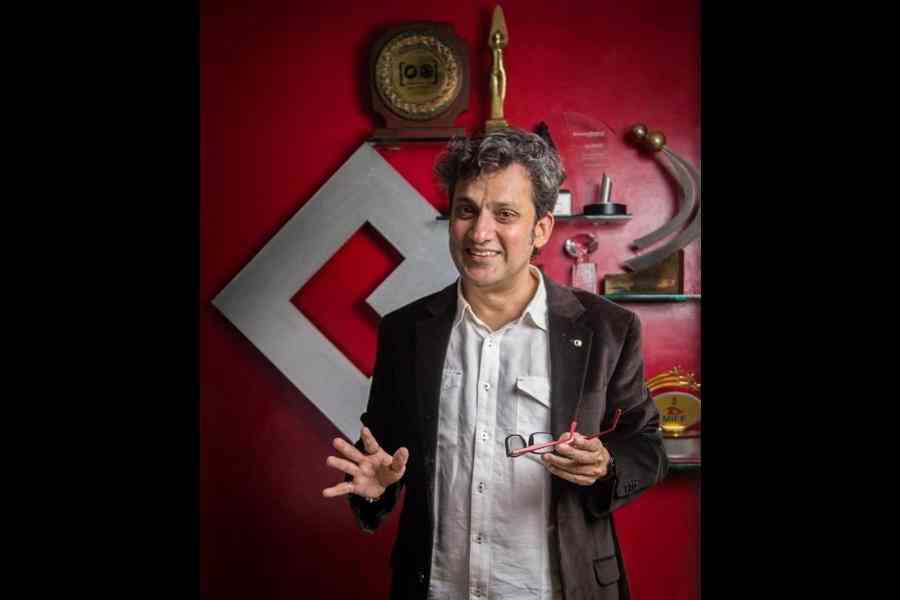The Storyteller, a well-told tribute to Satyajit Ray, is streaming on Disney Hotstar. Turning Ray’s two-page short story Golpo Boliye Tarini Khuro into a feature film in Hindi, the wit and the depth of the Calcutta-Ahmedabad equation (cuisine, culture, capitalism et al) also throws up the interesting debate of who owns a story. The storyteller who conceived it or the one who surreptitiously puts pen to paper and passes it off as an original?
Ironically, a similar debate happened behind the scenes of the film.
A social media post by Mazahir Rahim, an FTII-trained filmmaker living in Canada, was the first loud whisper. “Is there a reason why you do not acknowledge the writer of the film Kireet Khurana?” he asks Ananth, Paresh Rawal and Adil Hussain, the director of The Storyteller, and its lead actors.
A Facebook post by producer N.N. Sippy’s son Pravesh also piqued my curiosity. “…take a bow my friend Kireet Khurana. You deserve the appreciation The Storyteller screenplay is getting… Screenwriter Kireet Khurana develops a larger plot… in an unflashy but witty tribute to the master…” Using terms like “anything but imitative” and “fabulous writing” — with one line “directed by Ananth Narayan Mahadevan brilliantly” — the Sippy post was another alert.
A little sniffing around brought out a story. Gharaonda (1977), starring Amol Palekar and Zarina Wahab, was made by Bhimsain, the Father of Indian Animation who got 16 National Awards in his lifetime. “Gharaonda remains one of the most resonant films about Mumbai’s housing woes,” wrote a scribe a few years ago.
Stepping into his father’s domain of animation and going further, son Kireet Khurana has been writing and making movies and documentaries for decades including Saeed Mirza: The Leftist Sufi, a documentary on Netflix. Kireet too has bagged six National Awards so far.
But here’s the undocumented tale. Director Ananth Mahadevan made the perfect pick when he chose to pay tribute to Ray with Golpo Boliye Tarini Khuro. After getting the rights from Sandip Ray, Ananth put much thought into it. He toyed with the idea of making it a Calcutta-Kerala story but with Hindi as the language, decided to stick to Ray’s original of a capitalist from Ahmedabad. He found a producer and was spot-on with his casting. A conventional thought would’ve been to cast Rawal as the Gujarati but Ananth got him to play Tarini and signed Adil Hussain to play the Gujarati businessman. Ananth turned the two-pager into a merry film with undercurrents of messaging.
But somewhere in the process, the original screenplay writer Kireet got left behind; he wasn’t even told his work had grown into a finished product. Whatever additions may have been made later, the screenplay was registered in Kireet’s name. Enough to send Ananth and the producers a legal notice. Whispers suggest Kireet’s name was quietly added to the credits and the film was released without controversy.
Rather strange that in 2022, Ananth was on the other side of a similar situation when he’d got Nambi Narayanan, the scientist wrongly accused and tortured for espionage, to tell his story in Rocketry: The Nambi Effect. After a grand takeoff over breakfast with Nambi himself at the table at R. Madhavan’s Mumbai apartment, a quiet deal saw Ananth out of the project with the actor in the director’s chair. To think R. Madhavan and Ananth Mahadevan were Tamil-speaking buddies who had worked together in movies like Dil Vil Pyar Vyar (2002).
Recently, actor Anup Soni (son-in-law of Raj Babbar) posted that the INC had used a clip from Crime Patrol to bash Kejriwal — an unauthorised use. In 2006, Harvard student Kaavya Vishwanathan was pulled up for “literary identify theft”; musician Ram Sampath got a fat settlement from Rakesh Roshan for using his tunes in Krazzy 4.
In one form or the other, Ray’s story of appropriation of credit is truly timeless.











